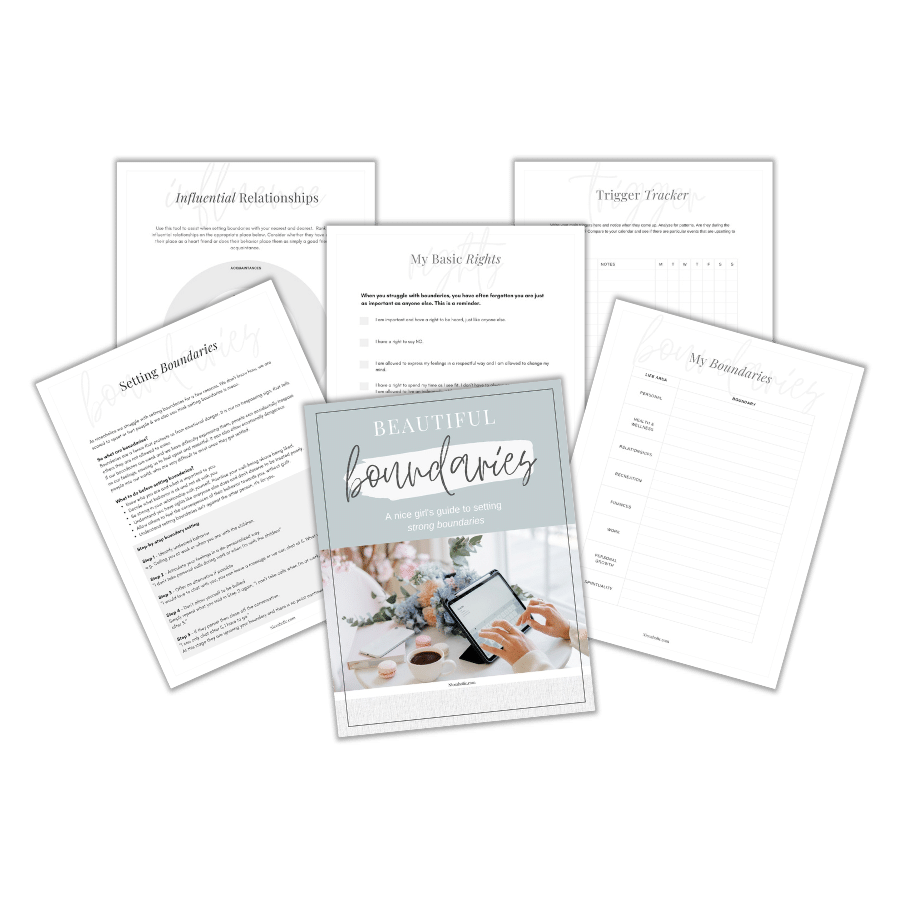Kindness Without Boundaries Is Self-Sabotage: How To Help Without Hurting Yourself.

Did you know that kindness without boundaries is an act of self-sabotage?
It doesn’t seem like it but being kind without emotional protection is quite dangerous.
As niceaholics, we excel at being thoughtful and kind to others. It’s what we do! However, we could be better at putting boundaries down, and if someone has treated us poorly in the past, usually that gets brushed aside because they need help.
What we should consider is whether someone is a safe person deserving of kindness in the first place. If they aren’t, we are putting our emotional safety at risk.
If we proceed, we sabotage ourselves emotionally, returning to our default which is, ‘if someone needs help regardless of how they treat me, I will help them’.
In this article, we will discuss how to be safe when being kind and how to put down boundaries nicely.
Let’s begin!
What is kindness without boundaries?
Kindness without boundaries is giving endlessly to others without thought for oneself. It can be seen as a selfless act, but it hurts the giver (a lot more than they realize!). As niceaholics, we are always kind and giving, but we often don’t leave anything for ourselves and end up feeling resentful and overwhelmed.
This eventually leads to collapsing from burnout, which can have serious consequences for mental health.
The dangers of being too kind
When we are too kind, we often allow people to take advantage of us. We give and give until we are emotionally and mentally exhausted. We sabotage our happiness because we are kind without boundaries. This can lead to resentment, anger, and even depression. It is important to be kind and set boundaries so that you do not become a doormat for others.
Signs we are being too kind are:
- We get used all the time by more than one person
- Feelings of resentment
- We attract toxic people
- We are exhausted
- Suffer from depression and anxiety
- If we need kindness and understanding, it’s not returned
I think the biggest danger of being too kind is it can cause you to change who you are because you are sick of being a doormat.
When you are burnt out and exhausted, it’s hard to be kind to anyone, even nice people!
Kindness vs. Niceness
How is kindness different from niceness? On the surface, they sound the same thing, but there are some key differences.
| Kindness | Niceness |
|---|---|
| Internally driven | Focused on appearances |
| Compassionate, Empathetic | Pleasant and enjoyable |
| Selfless | Can be self-motivated |
| Loving and Considerate | Sometimes isn’t genuine |
According to The Collins Dictionary, someone who is kind ‘behaves in a gentle, caring, and helpful way toward other people.’
However, if you say something is nice, you mean you ‘find it attractive, pleasant, or enjoyable.’
Kindness is a beautiful trait. It’s loving and empathetic and comes without strings. It’s seeing someone in need and doing something to make their lives easier, without expectation.
It isn’t used like niceness is…being pleasant with the aim of getting a certain outcome (special treatment, being liked etc.). Kindness doesn’t ask for anything in return, and comes from empathy and compassion for others’ humanity.
You can certainly be kind and not nice. If you are a parent you will know this too well! Sometimes you need to be cruel to be kind, and say no snacks before dinner.
Because your child hits their sibling, does that make them not a kind person? No, it doesn’t. Their behavior, however, is not very nice!
How do you know if you are being too kind & self-Sabotaging?
If we keep in mind that kindness without boundaries is self-sabotage, then being too kind is continuing to express kindness to people who don’t deserve it and putting our mental health in danger.
People who are dangerous to express kindness to:
- Have a history of previous bad behavior toward you
- You have given a lot of kindness to this person in the past, and it hasn’t been returned
- They have behaved poorly to your friends or family
- You are being kind to receive validation they wll not give
If you are being too kind to these types of people, in particular, you are at risk of self-sabotage.
They will not care about your needs, and your kindness will disappear into a bottomless black hole.
Your time and energy are wasted here. Goals and dreams of yours remain on the back burner, and for what?
What are boundaries, and how do they help?
Boundaries are an internal fence that protects you from being emotionally hurt by others. It’s our line in the sand, and it’s what we will or won’t accept from others.

bOUNDARIES ARE AN INTERNAL FENCE THAT KEEPS YOU EMOTIONALLY SAFE FROM TOXIC PEOPLE
An example of a boundary is
- You have told your boss you don’t take work calls on weekends. She rings you on Sunday night, and you let it go to voicemail.
- After many discussions with your mother-in-law, she still insists on discussing your weight. Next time she brings it up, you leave the room or end the call.
- Your friend hasn’t paid back the money they owe you and asks for another loan. You say you are unable to help until the last one is paid back
Would it be kind to help your boss out on the weekend? As you know, she has a lot on her plate. Yes, it would. Is it hurtful to yourself and your family if you keep taking her calls all weekend? Yes, it is! So we have a conflict.
Let’s think this through. Being kind at all costs is not good for you, as it sabotages the things you care about.
It would be best if you had boundaries in place, so you can continue to be kind in the future, or you will become exhausted and angry about it.
If you have no rest from work (& you don’t get paid for it), it is not kind to your family to take her calls, because you will become tired and grumpy.
So a boundary is needed to define this for everyone involved clearly.
Download our free
Beautiful Boundaries Planner
(AND JOIN OUR GOODIE FILLED NEWSLETTER)
How to set boundaries while still being kind
There is nothing wrong with being kind. It’s one of the most beautiful qualities a person can have. The problem arises when we are too nice and allow people to take advantage of us. This is where setting boundaries comes in.
It’s important to be clear about what you will and won’t tolerate from others, or otherwise – like our boss above – they will continue to take advantage of your kindness.
At the same time, you don’t want to come across as mean or unkind, so finding the balance can be tricky.
Here are a few tips on how to set boundaries while still being kind:
Communicate assertively without being aggressive.
Explain calmly but firmly your expectations and why they matter to you.
For example, “I need some space right now so I can concentrate on my work. I would appreciate it if you could please not talk to me for a little while.”
Be direct.
Don’t beat around the bush or try to sugarcoat things – say what needs to be stated clearly and concisely. Kind boundaries are also crystal clear.
Choose your timing wisely.
Don’t bail them up while they are having a heated discussion with their child or partner.
Wait until the mood is friendly and neutral before raising the issue. This way, you can be sure they heard you, and it has a greater chance of being well received.
Boundaries that are kind are also considerate.
Be gentle when setting the boundary.
When they overstep, repeat the boundary in a calm voice. You are simply reminding them where the line is.
If they continue to do it, repeat it firmly without smiling this time. Maintain eye contact and watch to see if it has registered. Then change the subject.
Repeated infringements are a different matter, and then your boundary is being ignored.
When this happens, you should stop being kind and start emotionally defending yourself by removing yourself from the conversation.
If you continue to be kind from this point, you are self-sabotaging and giving in to this poor treatment.
What does self-sabotage mean when it comes to kindness?
What do we mean when we say kindness without boundaries is self-sabotage?
Self-sabotage is a behavior that helps to create negative results in our life.
It involves doing things that can harm or disrupt our success.
Self-sabotaging behaviors can be destructive and lead to dissatisfaction and defeat, which can often keep people from reaching their goals.
When we invest too much time being kind to others, it can come at the cost of our goals and dreams. We can become so fixated on other people’s needs that we forget our own.
Acts of kindness are a great way to avoid dealing with our problems and keep us busy enough to justify our lack of time to address our issues.
That’s why boundaries are essential. If you are a kind person, you have to say no sometimes to be kind to yourself.
It’s self-sabotage if we continue to be kind to everyone and completely disregard our needs.
A Final Note.
Kindness without boundaries causes self-sabotage because we neglect our goals and dreams while being kind and helping others.
It’s important to have boundaries in your life to protect yourself emotionally and to care for your mental health.
When you’re too kind without any boundaries, you end up sacrificing your own needs and wants. This could lead to unhealthy relationships with others where you feel like you’re always the one giving and never receiving anything in return.
Eventually, this behavior can take a toll on your emotional well-being and cause self-sabotage because you can’t function well enough to achieve your own goals and dreams.
Kindness is a beautiful trait to have, so don’t stop being kind! Just make sure to do so with boundaries in place to protect your heart, so you can keep being kind to people who deserve it.
Have you sabotaged yourself by being too kind? Let me know in the comments below.
As always, love, remember to be kind to yourself too.
Love









